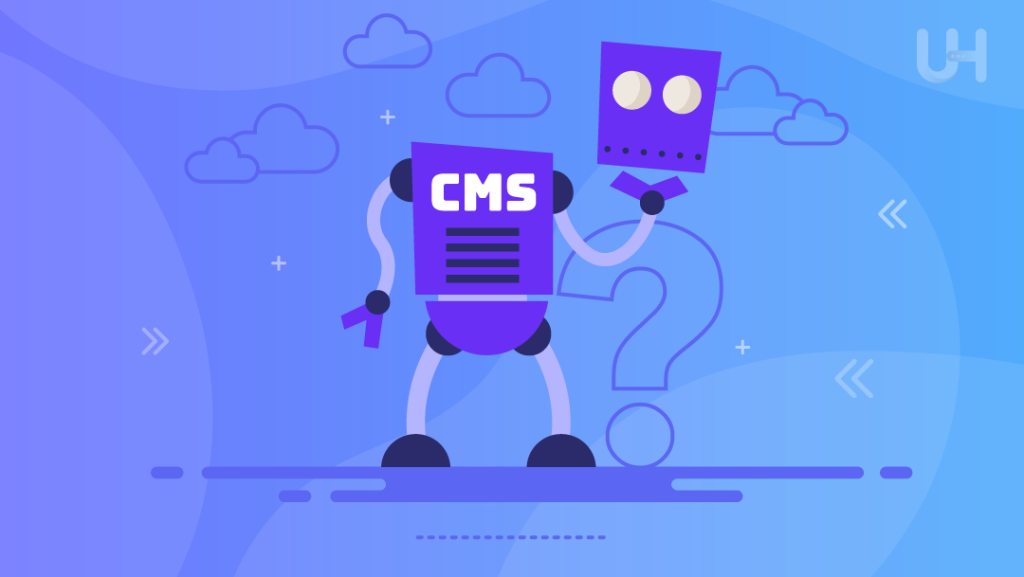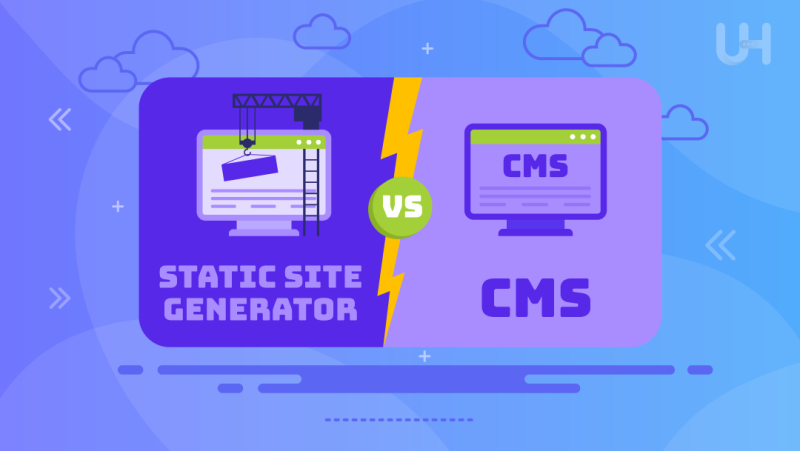Web development has come a long way in recent times, from bare-bones HTML websites to full-blown web applications. Despite the revolution, content-heavy websites are still widely used. That is where the need for static site generators arises. In this article, we will delve into the debate between a static site generator vs CMS and help you make an informed decision.
While a content management system helps build immersive websites, they consume higher server resources and need powerful VPS hosting to ensure a smooth user experience. Static site generators, on the other hand, can create static pages that are rendered on the server side. Therefore, these sites load faster and are ideal for building informational websites. So, let’s delve into SSG vs CMS to help clear the air.
What is a Static Website?
A static website consists of fixed content. Each page is coded in HTML and displays the same information to every visitor. The content of these pages does not change in response to user interactions or over time unless a developer manually updates them.
Here are the key characteristics of a static website:
- Fixed Content: The content stays the same until a webmaster changes it manually.
- Simple and Fast: Static websites load faster because they don’t rely on server-side processing. They are plain HTML, CSS, and sometimes JavaScript files served directly to the user’s browser.
- Easier to Host: They can be hosted on any value for money dedicated server that serves HTML files, often at a lower cost compared to dynamic websites.
- No Server-Side Scripting: Static websites do not use server-side scripting languages like PHP, Python, or Ruby. Furthermore, they don’t interact with databases.
- Security: Static websites are more secure since they don’t involve server-side processing or databases, reducing the risk of server-side vulnerabilities.
What is a Dynamic Website?
Dynamic websites, on the other hand, generate content dynamically based on user interactions or other real-time factors. They typically use server-side rendering and databases to create content on the fly, which makes them more suitable for complex applications like e-commerce sites, social media platforms, and content management systems.
Static Site Generators vs CMS: Comparing the Differences
Here is a head-to-head between a static site generator vs CMS. You should compare the factors to decide which makes more sense for your application.
Performance
In the case of static sites, page load speed depends on the client’s infrastructure. Since the end user downloads the content from a static site and CMS at the same speed, the only deciding factor is how quickly can the client’s device display the requested content. Since SSR sites are rendered in advance, they usually load quicker, even on low-bandwidth internet connections.
However, you can accelerate server-side rendering using a Content Delivery Network. This helps CMS sites load just as quickly as SSR websites. So, whether you should choose a static site generator or CMS, depends on your utility.
Elevate Your Website with Managed WordPress Hosting
Take your website to the next level with Ultahost’s LiteSpeed WordPress Hosting plans. Enjoy 5x faster loading times than competing services with our WP hosting solutions that are precisely built to maximize speed and performance.
Security
Static websites have zero server-side rendering and dynamic parts, they offer a smaller attack surface compared to dynamic sites. The biggest security vulnerability of using an SSG is an attacker compromising the version control system you use to maintain the website.
CMS-based websites offer a greater surface area for malicious attacks. Therefore, it takes a lot more effort to secure a CMS-based site. For example, you can install WordPress security plugins to protect a WordPress website from malicious attacks. Furthermore, you must constantly patch your core CMS, WordPress in this case, to stay protected from malware attacks.
Ease of Use
Static site generators are easy to use if you have a basic knowledge of programming languages. Experienced web developers often use SSGs for precision which is difficult to achieve with a traditional CMS.
CMSs, on the other hand, are user-friendly and do not require technical know-how to operate. They have WYSIWYG (What you See is What You Get) builders, meaning anyone can start building a website in minutes. So, if you are new to web development, a CMS is the better choice. If you are an experienced webmaster looking for custom coding opportunities, an SSG is your best bet.

Features
While most static site generators support plugins, they lack an extensive plugin database that CMSs like WordPress or Drupal offer. While you can add custom functionalities to an SSG with the help of markup languages, it is going to be a lot more expensive to maintain than a simple third-party plugin.
Content Management Systems hit the ball out of the park in terms of features. You can install plugins to CMS-based sites to extend their functionality. From live chat and performance to analytics, author bio, comments, migration, etc., there are plugins for everything.
Affordability
Static sites are more cost-effective since they don’t require server-side rendering. Most SSG-based websites store raw content in control systems like GitHub, Bitbucket, etc., and use a build process to run the SSG and publish the files to a service such as GitHub or GitLab Pages.
CMSs are more expensive to operate as services like contact forms and comments require server-side rendering. As a result, CMS-based websites require a powerful web host to meet the client’s requests. As a result, using an SSG is overall cheaper than a CMS.
Reliability
Static site generators are more suitable for building reliable websites since they have fewer moving parts. Therefore, the chances of something failing are slim. Plus, even if something goes wrong, a knowledgeable web developer can restore the website easily. However, if you have to hire someone to restore an SSG site, things can quickly become expensive.
This is where a CMS-based site has an edge. While they are more sensitive to code conflicts and malfunctions, you can restore a CMS website without technical know-how. So, if you are familiar with programming languages, SSGs are the better choice. For everyone else, CMS is the better choice.
Conclusion
As evident, there are several pros and cons of using a static site generator and CMS. So, the choice rests on the user. You must weigh the benefits and drawbacks of your situation. So, at the end of the day, both static site generator and CMS are capable website-building tools. So, choose wisely.
Enhance your web applications with Ultahost’s top-tier Java Hosting plans. Enjoy unmatched flexibility, infinite scalability, and exceptional performance at competitive prices starting from just $5.99/month.
FAQ
What is the difference between SSG and CMS?
An SSG generates HTML content before serving it to the end user, while a CMS renders content in real-time for dynamic websites. SSGs require technical know-how to operate while CMSs employ WYSIWYG editors that do not need programming knowledge.
When should I use a static site generator?
You should use a static site generator if you need to build a website that pre-renders content before users request to see it. Therefore, SSGs are not suitable for building dynamic websites.
When should I use a Content Management System?
You should use a CMS if you are building a dynamic website where audience interaction is the key. Furthermore, if you are new to web development, a CMS like WordPress or Drupal will help you get started without coding.
Which is the best Content Management System?
The best Content Management System is the one that meets all your business needs. You should compare the most popular CMSs like WordPress and Drupal to make up your mind.
Which is the best static site generator for beginners?
The best static site generator for beginners is the one that you are most comfortable using. Try your hands at the most popular SSGs to make up your mind.
Is an SSG good for SEO?
Static site generators are good for creating SEO-optimized websites since they render content in advance, allowing web crawlers to index pages and showcase them when viewers request.
What are the cons of using an SSG?
The primary drawback of using SSGs is the lack of an interactive interface. SSGs are designed for experienced web developers. Therefore, they are not beginner-friendly.










